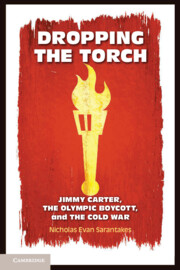Book contents
- Frontmatter
- Contents
- Acknowledgments
- Abbreviations
- Introduction Miracle on Ice
- Chapter 1 Lord Killanin and the Politics of the Olympics
- Chapter 2 Los Angeles versus Moscow
- Chapter 3 Jimmy Carter and U.S.-Soviet Relations
- Chapter 4 The Soviet Invasion of Afghanistan
- Chapter 5 The American Response
- Chapter 6 Easy Victories
- Chapter 7 Painful Losses
- Chapter 8 The White House Games
- Chapter 9 Coca-Cola, NBC, and the Defeat of the Iron Lady
- Chapter 10 The Vote in Colorado
- Chapter 11 Civil Wars
- Chapter 12 Carter versus Killanin
- Chapter 13 Moscow: The Olympics Are the Olympics
- Chapter 14 Los Angeles
- Chapter 15 Conclusion
- Epilogue
- Notes
- Bibliography
- Index
Epilogue
Published online by Cambridge University Press: 05 September 2012
- Frontmatter
- Contents
- Acknowledgments
- Abbreviations
- Introduction Miracle on Ice
- Chapter 1 Lord Killanin and the Politics of the Olympics
- Chapter 2 Los Angeles versus Moscow
- Chapter 3 Jimmy Carter and U.S.-Soviet Relations
- Chapter 4 The Soviet Invasion of Afghanistan
- Chapter 5 The American Response
- Chapter 6 Easy Victories
- Chapter 7 Painful Losses
- Chapter 8 The White House Games
- Chapter 9 Coca-Cola, NBC, and the Defeat of the Iron Lady
- Chapter 10 The Vote in Colorado
- Chapter 11 Civil Wars
- Chapter 12 Carter versus Killanin
- Chapter 13 Moscow: The Olympics Are the Olympics
- Chapter 14 Los Angeles
- Chapter 15 Conclusion
- Epilogue
- Notes
- Bibliography
- Index
Summary
Jimmy Carter
After leaving office on a high note with the return of the hostages that Iranians had held captive in the U.S. embassy in Tehran, he returned to Plains, Georgia, profoundly depressed. He found relief in the physical labor of repairing his house, which had seen little upkeep during his political career. In his retirement, he became a prolific author, writing over twenty books that included several memoirs, a collection of poetry, a historical novel about the American Revolution, an illustrated children’s story, a self-help book about aging, a work of theology, and a travelogue on fly fishing. In addition to establishing the Carter Presidential Library, he founded the Carter Center that would focus on promoting democracy and public health issues. The organization gave him a platform with which to address diplomatic and public policy issues. He had to wait until Reagan left office, though, before he was asked to perform diplomatic missions. “It was like opening a new door for me.” The same intellectual arrogance that lead him to believe he could master all sorts of policy matters lead Carter to act on his own, independent of the Bush and Clinton administrations. This behavior so infuriated President Bill Clinton that the two had a yelling match in the Oval Office. Despite offending a number of administrations, Carter received the Nobel Peace Prize in 2002. In his acceptance speech, he said, “War may sometimes be a necessary evil. But no matter how necessary, it is always evil, never good. We will not live together in Peace by killing each other’s children.” When asked if the Nobel vindicated his presidency – a question based on the premise that his time at the White House was a failure – he replied, “I don’t know of any decision I made in the White House that were basically erroneous.”
- Type
- Chapter
- Information
- Dropping the TorchJimmy Carter, the Olympic Boycott, and the Cold War, pp. 267 - 276Publisher: Cambridge University PressPrint publication year: 2010

